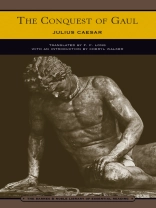Among the most durable and engaging texts in world literature,
Julius Caesars
Conquest of Gaul tells how he and his legions conquered much of modern France in less than a decade (58-51 BCE), despite determined resistance. Perhaps the most famous Roman ever, Gaius Julius Caesar created a legacy which has resonated, for good or ill, throughout Western culture. Architect of an imperial system, eponymous sponsor of a reformed calendar system, orator second only to Cicero, conqueror of Gaul: Surely those accomplishments in the diverse fields of politics, applied mathematics, rhetoric, and military science would justify his eminence. Nevertheless, the high literary quality and historical value of this seemingly modest account match its exciting story of diplomatic maneuverings, shifting alliances, and military actions; the final chapters culminate in the revolt of the united Gallic tribes under Vercingetorix, Frances first national hero, and are as compelling as any contemporary spy thriller.
Sobre el autor
Julius Caesar was born in 100 BCE to a distinguished, although not politically prominent, patrician family. During his praetorship (62 BCE) and consulship (59 BCE) Caesar espoused positions and causes which excited great passion. He generated the military forces and political clout which made him, first, a conqueror of the territory from Northern Italy to the far side of the English Channel, then a contender for world dominion in 49 BCE.












